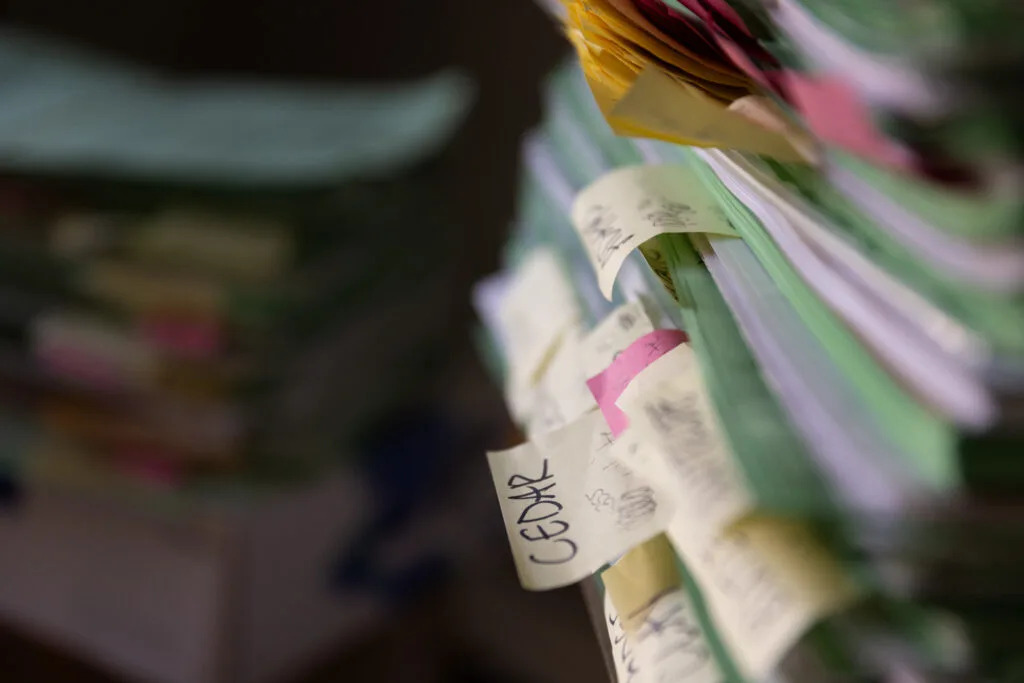Stacks of signed petitions sat in Crista Eggers’ home in Omaha in May 2022, awaiting submission to the State of Nebraska. Eggers is the statewide campaign coordinator for Nebraskans for Medical Marijuana. (Courtesy of Rebecca S. Gratz)
GRAND ISLAND, Neb. — All charges against a notary public from York accused of “official misconduct” have been dismissed, which could have an impact on a pending case against the medical cannabis petitions he helped notarize.
Hall County Judge Alfred Corey accepted a “motion to quash” Friday from Attorney Mark Porto on behalf of Jacy C. Todd, 53. The State of Nebraska and Hall County Attorney Marty Klein had charged Todd with 24 counts of “official misconduct” for allegedly invalid notarizations.
Each count was a specific date when Todd was accused of notarizing petition pages circulated by Michael Egbert of Grand Island without both men being in the same room, as required under state law. Egbert had admitted to using a phone book to add voters to the petition pages and accepted a plea deal: a misdemeanor and $250 fine, reduced from a felony.
Attorney General Mike Hilgers and Hall County Attorney Marty Klein host a news conference related to a Grand Island man charged with collecting allegedly fraudulent signatures on two petitions related to medical marijuana earlier in 2024. Sept. 13, 2024. (Screenshot by Zach Wendling/Nebraska Examiner)
Klein and the Nebraska Attorney General’s Office argued that notaries were public officials and that Todd “knowingly” violated the law. Corey rejected those arguments without addressing the allegations.
“While these duties greatly assist others, notary publics are not public servants who are performing governmental functions,” Corey wrote in a four-page opinion Friday.
Todd’s attorney, Klein and the Attorney General’s Office did not immediately respond to requests for comment Friday evening.
Notaries are ‘clerical and ministerial’
Corey said he could not find any similar Nebraska cases on a similar matter or motion to quash.
Instead, Corey pointed to a 1984 case from the U.S. Supreme Court, Bernal v. Fainter, that dealt with Texas notaries. The justices wrote, “We recognize the critical need for a notary’s duties to be carried out correctly and with integrity.”
“But a notary’s duties, important as they are, hardly implicate responsibilities that go to the heart of representative government,” the court wrote. “Rather, these duties are essentially clerical and ministerial.”
The U.S. Supreme Court pictured on September 28, 2020. (Courtesy of Al Drago/Getty Images)
Justice Thurgood Marshall, writing for the 8-1 decision, distinguished nongovernment personnel from those who are responsible for policymaking or have “broad discretion in the execution of public policy that requires the routine exercise of authority over individuals.”
“Neither of these characteristics pertains to the functions performed by Texas notaries,” Marshall wrote.
Attorneys defending the sponsors of the medical cannabis measures or representing other notaries who have been accused but not formally charged with similar counts have consistently said that no notary has ever been charged or convicted in such a manner. A state official who oversees notaries, David Wilson Jr., has said the same.
David Wilson Jr., associate general counsel and licensing director for the Nebraska Secretary of State’s Office, gives testimony on the first day of the civil trial to determine the validity of the medical marijuana ballot measures at the Lancaster County Courthouse on Tuesday, Oct. 29, 2024, in Lincoln. (Kenneth Ferriera-Pool/Lincoln Journal Star)
Pending district court case
Lancaster County District Judge Susan Strong is currently weighing a broader case in part from the AG’s Office, on behalf of Nebraska Secretary of State Bob Evnen, seeking to invalidate the medical marijuana ballot measures.
The AG’s Office is arguing that any instance of circulator “fraud,” which Egbert was accused of, or notarial “malfeasance,” as Todd was accused of, should be extended to all signatures they touched.
A vast majority of the challenged signatures are related to “notarial malfeasance” alleged against about eight notaries, including Todd and one ballot sponsor. At the four-day trial, Wilson said his office had received only one complaint against a related notary, from Jennifer Henning, a paid petition circulator, against a lead ballot sponsor: Crista Eggers.
Henning, a witness for Evnen, alleged Eggers had not signed her circulated petitions in person, similar to Egbert’s allegations against Todd. Wilson said at the time an investigation into Henning’s complaint was just beginning.
The ballot sponsors noted that Henning has been sanctioned by Nebraska courts in the past for fraudulent and improper conduct and is currently on probation for felony insurance fraud. Henning said she was not on proper medication at the time for her mental health.
Lancaster County District Judge Susan Strong listens to opening statements from attorneys on the first day of the civil trial to determine the validity of the medical marijuana ballot measures at the Lancaster County Courthouse on Tuesday, Oct. 29, 2024, in Lincoln. (Kenneth Ferriera-Pool/Lincoln Journal Star)
Nebraskans overwhelmingly supported Initiative Measures 437 and 438 in the Nov. 5 election, to legalize and regulate medical cannabis.
State constitutional officers will meet Dec. 2 on whether to certify the election results, including Evnen and Nebraska Attorney General Mike Hilgers, who have said that at this juncture they will certify the marijuana measures.
Corey said that while many other states consider notaries to be public officers, Nebraska has outlined an administrative process through the Secretary of State’s Office to determine whether to maintain, suspend or revoke a notary’s license.
“The State attempts to differentiate what criminal activity would be as opposed to noncriminal activity,” Corey wrote. “The Court rejects this argument.”
Corey permanently dismissed the case and ordered the state to pay associated costs.
H/T: news.yahoo.com



